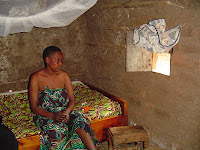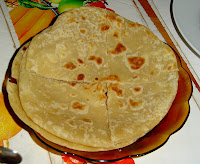We are looking at expanding TAFCOM’s micro-loan
program for small businesses as this seems like an empowering way to provide a
more stable income for the women of Pasua and their families. At the least,
families will be able to pay for food and rent. We hope that eventually money
can also be saved to cover school fees for their children. We have decided to
add a small interest rate that will be set aside in case of emergencies. One of
the most difficult obstacles occurs when someone becomes ill. Unless there is
another family member to help, the business must temporarily shut down meaning
there is no income until the person is well again.
In addition, we will try to organize a workshop on
business management, budgeting and saving. As we have been updating the
home-based profiles I have become aware that there are many women who could
benefit from a micro-loan. I feel that this strategy is the best way to
increase a family’s chance of improving their lives. Each loan is for 100,000
TSh (approx. &70 USD) with 5% interest. Loans are paid back in either a 6
or 12 month time frame. Of all the
profiles I read, every one of the women had repaid 100% of their loan.
Tuesday we spent visiting our families. Juma has
everything in place to start her charcoal and firewood business. We provided
her with the startup funds. It was the first time I have seen her smile. She
was so grateful. She also said that she had been using the wrap on her leg and
it is helping. I asked Nie to find out if Juma’s daughter’s school fees were
current and they are not. We will help with the fees next time we see her. Her
daughter is a very good student and enjoys school. We will return next week to
see how her business is going.
We were going to start our life history with Veronica
but when we got there she was in bed and two neighbors were there. Her
breathing was very labored. The neighbors had taken her to the hospital but
they neither had the medicine or the injection she needed. The one neighbor is
able to give her the injection so we gave him funds for both. We did not stay
long because she was tired and not feeling well. We are taking pictures for the
profiles and when we asked Veronica she said that other volunteers had taken
her picture but no one had given her a copy. I promised to make sure she has
her own picture and we agreed to come back next Tuesday. Tonight Nie will
return to Veronica’s with her inhalers. We are buying two so she has an extra.
I asked Nie how Veronica could raise two grandchildren
with her health being so poor. There are neighbors who provide support and look
in on the family but the children are basically raising themselves. They are 4
and 11.
Ester was not home so Nie left a message with a
neighbor to have her come to Nie’s house. We want to make sure there is another
food stand nearby so she can expand her business.
 |
| Salma and Daughter at Food Stand |
I talked with Nie about the feelings of hopelessness
and discouragement. She said that for many people this is a constant state of
mind. It is only when a person knows where their meals are coming from for
several days that they can think about the future. She reiterated that they all
want schooling and a better life for their children. It is so difficult when
they can’t afford to continue a child’s education past primary school. These
people have a strength that keeps them going day after day. Faith seems to be
very important also and I will explore this topic another time. After our
conversation we had been walking in silence for a few minutes when we passed a
school. Nie remarked that the children just said, “We all have a right to an
education. Good Morning, teacher.” How
fitting!
 |
| Boys Holding Hands |
 |
| Children with Porridge |
When we returned from the Children’s Center we stopped
at Mwezi Hospital to visit Mwamini and Rose. (the 9 month old baby discussed
last week) Rose has pneumonia and an intestinal infection. She is on some kind
of IV drip. (I don’t think much is shared by the doctors and nurses because it there
is very vague information about her care.) Mwamini is unable to go home as
there is not staff to watch over the or feed the children. Nie visited the
family the previous evening and found the children to be alone. She contacted
the 17 year old daughter and firmly informed her that she has to be responsible
for these children while her mother is in the hospital and she should also go
see her mother. Nie also made it clear to Mwamini that she needed to tell her
daughter to look after the children. There are some neighbors currently checking
on the children, making sure the house is safe at night and the children get up
for school. Nie has provided food and we will support the family until they can
get back on their feet. Because she is at the hospital, Mwamini is unable to
sell her soaps.
Rose was wrapped in the blanket we gave her but was
dressed in light clothing. Mwamini explained that Rose had vomited on her only
sweater. Nie and I gave her all the money we had so she could buy food.
After returning home I went to the market and bought
some baby clothes and a small stuffed frog.
Thursday – It has rained very hard the last two nights
which is much needed. Many people say they enjoy the rainy season because there
is so much sunshine at other times of the year and they welcome the change!
That would certainly not be my way of thinking…
We returned to the hospital with the clothing and
Mwamini was grateful and said they would definitely fit Rose. The ward was
being cleaned so all the people were out of the room. Rose looked better today.
Her eyes seem clearer and she is more alert. How conflicted Mwamini must be not
really knowing how her children at home are doing mixed with the concern and
uncertainty of Rose’s health.
 |
| Upendo Orphanage |
 |
| New Blankets for Infants at Upendo |
Friday - Went
to the hospital and brought diapers. Rose did not look so good and Mwamini
appeared very weary. Apparently the blood test done on Thursday showed
something and Rose will be transferred to KCMC on Sunday or Monday after she
has completed the current round of IV medicine. (still don’t know what it is)
The diagnosis is also unknown; Mwamini will be meeting with the doctor. Nie
told Mwamini that she must take care of herself to be strong and able to care
for Rose. Nie will visit her Saturday and Sunday.
This was an emotional week so I stopped at a coffee
house Friday afternoon for a snack and journaled most of what follows:
 |
| Laundry Facility at St. Joseph's |
 |
| Wheelchairs |
As trained and experienced as I am in social work, I
cannot imagine the emotional toll this kind of work must take on Nie. It is so
very painful. She says that sometimes she just has to stop everything and walk away
for a while. I am fortunate in that I can pace myself in terms of my exposure.
Nie is only 35 but one of the wisest and strongest women I have ever known. She
is one of the unsung heroines of the struggle to end poverty.
How can anyone understand this when we don’t live it?
What kind of world do we live in that allows people to live in these conditions
while others flaunt their jewels and fancy cars? I never knew the depth of my
compassion until I came here. The compassion I feel has also given rise to an
even stronger feeling of love for these people. I sometimes wish I could just
hold the whole nation in my arms and gently rock them into contentment.
I remember well that when returning to the US after my
previous (and very short) trips, I had difficulty with feeling sympathy for the
struggles of some Americans as they seemed petty and irrelevant. I want to
embrace my current feelings of compassion and love and be able to carry them
with me for all situations I encounter. I do understand that everything is
relative and hope that I can continue to hold onto these feelings at home with
the knowledge that everyone experiences life differently and we are all at
different places on the roads of our lives.
I have always had trouble with our materialistic consumer-driven
society so I know that this will continue to be bothersome. I may have to learn
to bite my tongue and staying away from TV definitely helps. The other day the
TV was on during lunch. The program featured various new and innovative
products from somewhere in Asia. One item would help with arches and leg
muscles. The concept was the same thing as standing on the stairs and raising
and lowering your arches. Hard to imagine you could not find stairs or a curb
for this one. Next was a segment on rulers. They were made with various
materials; what I would call “designer rulers”. I would love to have seen the
prices as I am sure the cost of one could have fed one of our families for a
week.
While at the Aroma Coffee House journaling a woman walked by with
her young son (5 or 6). I said, “Jambo” so she stopped and helped her son
practice his greetings. He was pretty shy but did a good job. Greetings are
very important here and always take place before any other exchange, even in
stores. It is also fairly common that a mom will encourage their child in a
greeting with a muzungo. It feels as good as a hug!!!
So I will end this week with hugs to all……….. and these words from
a favorite website of mine. (www.dailyword.com) Each day presents a different affirmation.
World Peace
I hold in my heart the same teaching shared by all the world's religions: to treat others with the same loving-kindness I would like to receive myself. I am gentle and loving to the people I encounter, and I know consciousness will be shared with others.
 |
| Mt. Kilimanjaro from Moshi |















.JPG)


.JPG)




+&+Karoti.JPG)

.JPG)




.JPG)

.JPG)
